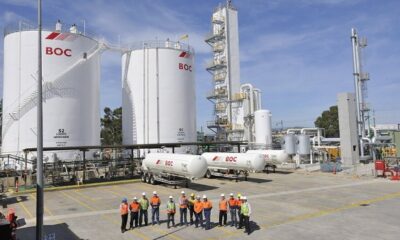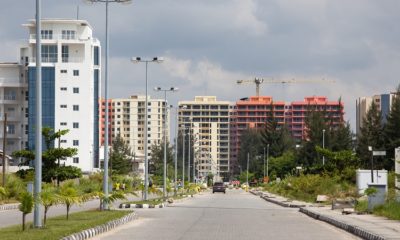Nigeria’s Economy Contracts by 6.10% in Q2 2020 as COVID-19 Bites
Nigeria’s economy contracted by the most on record in the second quarter as COVID-19 negative impacts plunged activities, according to the data released by the National Bureau of Statistics (NBS) on Monday.
Africa’s largest economy contracted by 6.10 percent year-on-year in real terms in the quarter under review. Bringing an end to a 3-year of low but steady economic recovery started after the 2016 economic recession.
NBS attributed the decline to drop in global and local economic activities due to the global pandemic that disrupted both logistics and global economic activities during the quarter.
Nigeria’s revenue generation plunged to a record-low during the period as low oil price and weak demand dragged on the nation’s foreign reserves and ability to services its petrol-dollar economy.
“The domestic efforts ranged from initial restrictions of human and vehicular movement implemented in only a few states to a nationwide curfew, bans on domestic and international travel, closure of schools and markets etc., affecting both local and international trade. The efforts, led by both the Federal and State governments, evolved over the course of the quarter and
persisted throughout,” the NBS noted.
However, when compared with the same period of 2019, when the economy grew by 2.12 percent, the economy declined by 8.22 percent and recorded a 7.97 percent decline when compared to 1.87 percent posted in the first quarter of 2020.
Accordingly, Nigeria’s real GDP contracted by 2.18 percent year-on-year in the first half of the year, down from 2.11 percent growth recorded in the same period of 2019.
On a quarterly basis, the real economy decreased by 5.04 percent. The report noted that only 13 sectors recorded positive real growth in the quarter, down from 30 posted in the first quarter.
Similarly, aggregate GDP declined by 2.8 percent from N35,001,877.95 million achieved in the corresponding quarter of 2019 to N34,023,197.60 million in nominal terms.
In general, the nominal growth rate contracted by 16.81 percent and 14.81 percent when compared with the second quarter of 2019 and the first quarter of 2020.
Oil Sector
During the period under review, Nigeria’s daily crude oil production stood at 1.81 million barrels per day (mbpd), representing 0.21 mbpd decline from 2.02 mbpd posted in the same period of 2019 and 0.26 percent lower than the 2.07 mbpd pumped in the first quarter of 2020.
Despite the reasonable moderate production level, growth in the oil sector contracted by 6.63 percent year-on-year in the second quarter, a decrease of 13.80 percent when compared to the corresponding period of 2019. Growth in the sector declined by 11.69 percent from 5.06 percent growth achieved in the first quarter.
On a quarterly basis, the sector contracted by 10.82 percent. Largely due to weak global demand for the commodity, especially the expensive Nigerian oil when compared to Saudi Arabia and Iraq offering huge discounts to sustain sales.
Still, the sector contributed 8.93 percent to the total real economy in the second quarter, lower than the corresponding period of 2019 and the preceding quarter, where it accounted for 8.98 percent and 9.50 percent, respectively.
Non-oil Sector
The real GDP of the non-oil sector contracted by 6.05 percent in the reference quarter. The first decline since the third quarter of 2017 and represents a 7.70 percent decline from the number posted in Q2 2019 and 7.60 percent lower than the first quarter of 2020 result.
Output in the sector was driven largely by Financial and Insurance, Information and Communication, Agriculture and Public Administration. NBS said these four non-oil sectors moderated the economy-wide decline.
According to the bureau, the Transport and Storage, Accommodation and Food Services, Construction, Education, Real estate and Trade experienced the largest decline in the quarter under review.
The non-oil sector accounted for 91.07 percent of Nigeria’s aggregate GDP in real terms. Again, higher than the 90.50 percent recorded in the first quarter and 91.02 percent posted in the same period of 2020.

 Billionaire Watch3 weeks ago
Billionaire Watch3 weeks ago
 Startups4 weeks ago
Startups4 weeks ago
 News4 weeks ago
News4 weeks ago
 News4 weeks ago
News4 weeks ago
 Bitcoin4 weeks ago
Bitcoin4 weeks ago
 Naira4 weeks ago
Naira4 weeks ago
 Forex3 weeks ago
Forex3 weeks ago
 Treasury Bills4 weeks ago
Treasury Bills4 weeks ago



























